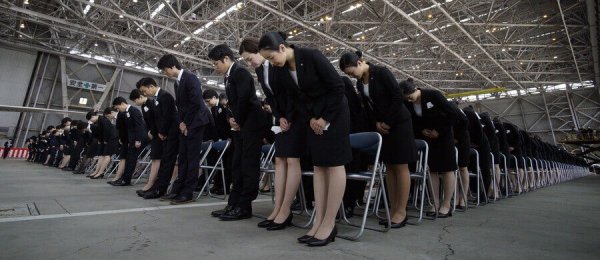Karoshi in Japan: Death from Overwork

On Christmas Day 2015, Matsuri Takahashi, a 24-year-old woman, threw herself out the window of her house and fell to her death. She had started working at Dentsu, a global advertising giant, in April of the same year. She was one more victim of karoshi in Japan or ‘death from overwork’. Japanese authorities have recognized this phenomenon since 1989.
On her Twitter account, Matsuri had admitted that she only slept two hours a day and that she had 20-hour workdays. She also wrote: “My eyes are tired and my heart is dead” and “I think I would be happier if I killed myself”.
These dramatic cases may seem far removed from our own countries and situations. However, karoshi in Japan is a brutal reflection of how far the capitalist mentality goes. It mixes meritocracy with the most strenuous competition. It makes people think that, in this way, they’re somehow more worthy of a place in this world.
Karoshi in Spain: Work is a matter of honor
On average, a Japanese employee works 2,070 hours a year. Overwork is the cause of death in about 200 people a year. These are usually from heart attacks, strokes, or even suicide. In addition to this, many serious health problems arise when people work to this extent.
This way of viewing work is one of the legacies of the golden age of the Japanese economy, which started in the 1960s.

In the 1980s, Japanese advertising extolled the self-denial of employees with the motto: “Are you ready to fight 24 hours a day?”
Karoshi in Japan
The reputation Japanese people have for carrying out good work to the point of obsession isn’t a myth. Many employees feel guilty when they take leave to go away on holiday. They fear that others will label them as the “one who’s resting and making others work in their place”.
There are cases of employees who don’t want to return home too early. They’re afraid of what they’ll tell their neighbors or relatives about their alleged lack of professionalism in their job. In addition to this, they’ll often go for a drink with their colleagues in order to foster corporate culture.
But, despite all this, their hard work isn’t actually very lucrative for the companies. In fact, their productivity is often described as low by external observers. These observers believe that this partly explains the lack of competitiveness in Japanese companies.
In the long term, this way of working isn’t only not very competitive in commercial terms. It also poses a health risk which, in turn, can lead to a collapse of medical resources.
In fact, depression and suicide as a consequence of overwork are already the main challenges that need to be addressed in a society obsessed with accumulating work hours.
How can a person reach karoshi?
The problem here is that “burnout” is still a concept that doesn’t appear in any of the major international classifications of mental disorders. People may be in the hospital with symptoms associated with exhaustion. They may suffer from extreme tiredness, emotional exhaustion, or depersonalization with insensitivity to others. However, doctors wouldn’t associate this with karoshi in Japan.
There’s no clear diagnosis for these symptoms. Nor are there any parameters to know if the limit has been reached on how much work can be done without risking health. This lack of mental health awareness, increasingly abusive work practices, and a labor market transformed by technology lead to companies breaking all the limits of acceptable dedication to work.
There’s a fear of unemployment and of being “out of the system”. This leads people to believe that working at any time, and for any number of hours, is a good option. The harsh reality, however, is that their intellectual abilities are reduced and the health consequences can be irreversible. There’s also a greater risk of the person falling victim to all kinds of addictions.
Karoshi in Japan is, therefore, “chronic stress” that a person can no longer resist. They can’t cope anymore and fall into depression.
Depression isn’t socially accepted
However, in Japan, the term “burnout”, is much more socially acceptable than depression. People consider extreme exhaustion as almost a “title of honor”. Depression, however, is clearly far less “honorable”, and people perceive it as a form of weakness.
Not only Japan experiences this phenomenon. In English-speaking countries, we would call a person with this problem a “workaholic”.
Let’s take two examples from Europe. In Spain, more than 12% of the population suffers from this and 8% work more than 12 hours a day. In Switzerland, one in seven active people admits to having been diagnosed with depression due to overwork.

Ways to fight karoshi
To fight this phenomenon, there must be a change in mentality. To begin, Japanese entrepreneurs have to reject the false idea that long working hours are essential. They’ll need to learn from European countries such as Germany, France, or Sweden and move towards a business model that promotes shorter days.
The Japanese government is already putting into practice legal reforms and more scrupulous administrative supervision. It’s now using its authority to try to end long working hours. They approved a reform that allows companies to stop paying overtime to workers who earn more than 80,000 euros a year. These are the most likely ones to experience burnout.
In addition, the state wants to impose a minimum of 5 days of paid leave for Japanese employees, in order to fight this overwork which is detrimental to employee health and business productivity. In the Land of the Rising Sun, workers are entitled to 20 days of paid annual leave, if they’ve been working at the company for at least six and a half years. However, in reality, they take less than half of their allocation.
The new law doesn’t apply to part-time employees, but only to those who are entitled to at least 10 days of paid annual leave. However, it would apply if there was a health risk due to work-related fatigue.
Taking positive steps
Finally, a really positive step to eliminating karoshi in Japan would be if the workers themselves were involved in the transformation of the workplaces. They should be making their voices heard in their companies and law enforcers. They should be demanding reasonable and acceptable working conditions that would relieve them of this unnecessary pressure.
As international citizens, it would be good for us all to reflect on this situation. Maybe we should be considering whether our excessive demand for services and products is actually promoting these unacceptable working conditions.
All cited sources were thoroughly reviewed by our team to ensure their quality, reliability, currency, and validity. The bibliography of this article was considered reliable and of academic or scientific accuracy.
- Nishiyama, K., & Johnson, J. V. (1997). Karoshi—death from overwork: occupational health consequences of Japanese production management. International Journal of Health Services, 27(4), 625-641.
- Uehata, T. (2005). Karoshi, death by overwork. Nihon rinsho. Japanese journal of clinical medicine, 63(7), 1249-1253.
- Kanai, A. (2009). “Karoshi (work to death)” in Japan. Journal of business ethics, 84(2), 209.
This text is provided for informational purposes only and does not replace consultation with a professional. If in doubt, consult your specialist.








